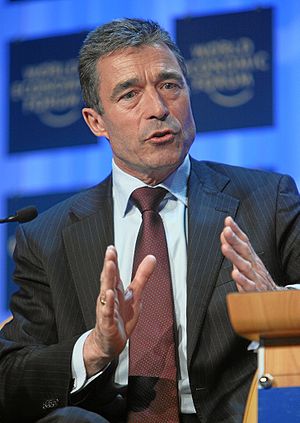 Image of Anders Fogh Rasmussen via Wikipedia
Image of Anders Fogh Rasmussen via Wikipedia
Copenhagen's Spring - Scientists Ask For Higher CO2 Cuts by Luca Marazzi
The International Scientific Congress on Climate Change was held in Copenhagen between 10th to 12th March and organised by the International Alliance of Research Universities (IARU): the conclusions will be published in a full synthesis report next June. Almost 1,600 scientific contributions of researchers from over 70 countries have been received, and more than 2,500 delegates attended the event.
Connie Hedegaard, Minister of Climate & Energy for Denmark said that we have "to avoid the unmanageable and manage the unavoidable" and she pointed to their example: this European country has become a net energy exporter in 30 years, creating green growth as a stable solution to the 70s oil crisis.
The messages of the congress are various. The risk that current trends of the climatic system will accelerate has a more defined and significant meaning: more probable abrupt and irreversible shifts, and we are already above the worst scenarios published by the Intergovernmental Panel on Climate Change (IPCC) in 2001. Thus the big problem is trying to at least slow down these trends if not reverse them.
The experts tell us that rapid regional and global mitigation strategies are needed and that the more we wait the more expensive and ambitious actions will have to be taken in the future. The fact that scientists have come to the point of saying that "inaction is inexcusable" means also that people who studied relentlessly for decades are frustrated by the inaction of governments, businesses and people: it is understandable given that their work has not been considered and used enough, if not at all, up to now. They are speaking louder and clearer now.
The different roles of politicians and scientists have to be combined. It is time for leaders to rely firmly on science as a basis for tough and unavoidable decisions. A "societal transformation" is being asked for by a wide group of the most intelligent people on the planet including diffusion of sustainable behaviours, innovative leadership, removal of subsidies and reduction of "vested interests". These are all very explicit messages to politicians and public alike: there is a lot of work to do between now and next December's COP15.
In the final debate the Danish Prime Minister, Anders Fogh Rasmussen, summarised the six messages given by scientists as 6 keywords: Urgency (of the climate change challenge), Direction (long term target to be defined), Action (short term targets to be set), Fairness (to the poorest and most vulnerable), Opportunity (to originate large benefits), Governance (creation of a new global multilateral era). He stated firmly that "business as usual is dead" and asked his colleagues to follow Obama's call for a Green New Deal, already asked for by public opinion and by many political parties in the world.
After the final debate with the panel of scientists, an impatient Rasmussen asked for clear words on the CO2 emission target to be set in the new treaty. Prof. Daniel Kammen, Obama's Senior Policy Advisor, stated that an entire new industrial revolution is needed to cut 1990's CO2 emissions by 80% in 2050 and Prof. Stefan Rahmstorf agreed on this point. The feeling was that the other panelists didn't mind...
At this point the Prime Minister concluded that the ambition for COP15 can be this - 80% long-term objective following the precautionary principle to avoid worse impacts (than the ones presented in 2007 IPCC report) already hypothesized by new works. Overall a more direct communication between scientists and policy makers took place at this huge meeting: now it's time for delegations to study and prepare the ground for brave steps forward to be made by the international community in Copenhagen's crucial Conference of the Parties #15. Will we be able to navigate better our "ship" in the solar system during the more than 200 rotations it will make before then?
Written by Luca Marazzi on behalf of Responding to Climate Change.
For further information on Climate Change please visit the Responding to Climate Change website - http://www.rtcc.org
Next event: Copenhagen, 24-26 May 2009. World Business Summit on Climate Change.
Article Source: http://EzineArticles.com/?expert=Luca_Marazzi
http://EzineArticles.com/?Copenhagens-Spring---Scientists-Ask-For-Higher-CO2-Cuts&id=2179360
http://psychedelichippiemusic.blogspot.com/
http://psychedelichippiefashion.blogspot.com/
http://www.soul-flower.com/Merchant2/merchant.mvc?Screen=SFNT&Store_Code=SOS&AFFIL=Robert_Muller
No comments:
Post a Comment